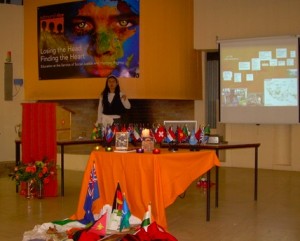Lintje’s story
(adapted from an article written by Neha Sud, an intern with Franciscans international, Geneva and an observer at the recent Edmund Rice International Symposium)
For a young Chinese-Indonesian, Lintje Siehoyono Sie has a curious first name. “Lintje”, a quaint, old Dutch name, is now rarely heard of, save perhaps in the knitting circles of the Ermas and Marthas. Yet, if it weren’t for this strangely misfitting name, Lintje would have never got an education.
Thirty-year-old Lintje, invited as a guest speaker at the Edmund Rice International Symposium on Education in the Service of Social Justice and Human Rights in Geneva, told her audience the moving story of her name, her ethnicity, and her hard-earned education.
Born Ling-Ling to a Chinese immigrant family in Ambon, Indonesia, Lintje said that she was re-christened at the age of four by Brother Leo Ratuanik, MSC, a teacher at the local Catholic school. Having often noticed little Ling-Ling at the playground, Br. Ratuanik asked her parents to enrol her in school. But to Ling-Ling’s parents, who already worked endless hours at a market stall to make ends meet, school was too heavy an expense, especially for poor Chinese immigrants in Indonesia.
During the Suharto regime, Chinese immigrants found themselves in a climate of extreme hostility. On account of their ethnicity, they were denied many rights – including that to education. “To get an education”, said Lintje, “the Chinese have to become Indonesian citizens.” On Br. Ratuanik’s urging, Ling-Ling’s parents finally agreed to bear the costs of making their daughter an Indonesian citizen. But then came the more trying part of assimilation. “To avoid discrimination from Indonesian authorities”, explained Lintje, “Chinese often changed their names and sacrificed something of their cultural identity. In order to attend school I had to adopt an Indonesian name.” It was thus that, to get Ling-Ling an education in her new country, Br. Ratuanik had to rechristen her with a name that would erase all traces of her old.
In the twenty-six years that she has had access to education, Lintje has achieved all that she aimed for, but it has not been easy. In school, she studied zealously so that she could earn a scholarship to attend college in Indonesia. Having excelled at college, she was granted another scholarship to pursue a Masters degree in the Netherlands. She then returned to a job as a Program assistant for the Cornell-Nanyang Institute of Hospitality Management in Singapore, before deciding to try her hand at a non-governmental organisation. She now works as the Asia-Pacific Program intern for Franciscans International in Geneva, a partner organisation of the Edmund Rice International (ERI). It was through their association with FI that ERI asked Lintje to share the story of her education at the symposium.
Lintje’s bitter struggle to gain and maintain her education is exactly the kind of ordeal that Edmund Rice International hopes to abolish.
